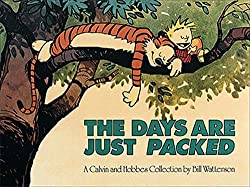VOCABULARY SPELLS SUCCESS IN SCHOOL
If students aren’t voracious readers early in life, they miss out on vocabulary that bookworm peers are absorbing. This happens to students with dyslexia, students from non-reader homes, students with ADHD, and even students who need glasses. Low vocabulary hurts academic work across all subjects. But, writing definitions on lists of vocabulary words produces notoriously poor long-term retention, not to mention a serious lack of fun. Comic heroes to the rescue!
SOME COMICS DELIVER VOCAB WITH A POW AND A ZAP!
Not all comics employ high-level vocabulary. But listen for a second to Calvin from Calvin and Hobbes: “Mainstream commercial nihilism can’t be trusted? Childhood is so disillusioning.” OK, so you have to see all four panels for that to be funny — but where else are you going to encounter words like nihilism, in context, with clever drawings making it memorable?
Better yet, discussion can blossom with an older reader about the philosophy of the historical John Calvin versus that of the historical Thomas Hobbes, paving the way to talk about irony in literature!
JUST HANDING STUDENTS THE BOOK WON’T DO IT, UNFORTUNATELY
Non-readers often enjoy a comic without actually reading or learning new vocabulary. Of course, you knew that. So teachers and parents add value by reading aloud and calling attention to the new words in a fun way. Most kids love to learn big, new words if they don’t think there’s a test. Learning words to understand a comic is motivating. I’ve found that gifted dyslexic students especially enjoy the comics method of building personal vocabulary.
THREE TIPS FOR USING THE VOCABULARY POWER OF COMICS
First, pick the right comics. Calvin and Hobbes appeals to a wide range of ages and interests. I also use Fox Trot, The Farside, and Garfield. Old newspapers and the internet are cheap sources of comics if you don’t have funds for books. Matching the humor style to the student makes it work.
Secondly, read comics aloud with lots of sound effects. This makes it fun and silly. It also means the students get to hear how the new words are pronounced. Finally, discuss the history and context — why is this funny? In a classroom, get multiple perspectives. Students often point out connections I missed!
MAKE IT STICK
There are endless ways to review and imprint new vocabulary learned via comics. You can provide copies of the comic (and perhaps scotch tape) so students can secretly deliver a comic to a favorite teacher’s door or mailbox. It’s only natural to re-read the comic several times while making the delivery. Provide time and paper for drawing one’s own comics, using newly learned words. Students can draw personal comics, using weird and wacky words they find in the dictionary, trying to stump the teacher.
Challenge students to make a comic out of a science concept or a math idea. Provide copies of comic strips, white-out tape, and a thesaurus so students can replace as many words as possible with synonyms. Then read the results out loud, making sure the student feels validated and it’s all in fun. The thrill of using white-out tape makes this one a favorite for some reason. Hand out comic books and let students enjoy 30 minutes of silent reading time. Have the students find one new word to share with the class at the end of the time. Don’t require the students to define their word — instead, let the class discuss it and end by reading the comic aloud to put the word in context and make sure everyone gets it.
THE GARFIELD DICTIONARY
If you do need to have students look up words or copy definitions in order to meet standards or word lists for a book, make it fun with The Merriam-Webster and Garfield Dictionary. There are cartoons on nearly every page, so looking up words feels like a treasure hunt. The dictionary is recommended for upper elementary, but I use it with high school students all the time and they love it. The only problem with this dictionary is that it tends to walk off!
NEW VOCABULARY SHOULD BE FUN
All great teachers, pedagogues, and academics know that if you learn something while laughing, chortling, or guffawing you’ll remember it. If it feels like drudgery, grunt work, or travail you’ll likely forget it right after the test, examination, or assessment. So new words should come with a large dose of fun, that is, jollification, entertainment, and amusement.
by Yvonna Graham, M.Ed.
www.dyslexiakit.net
@GrahamYvonna
